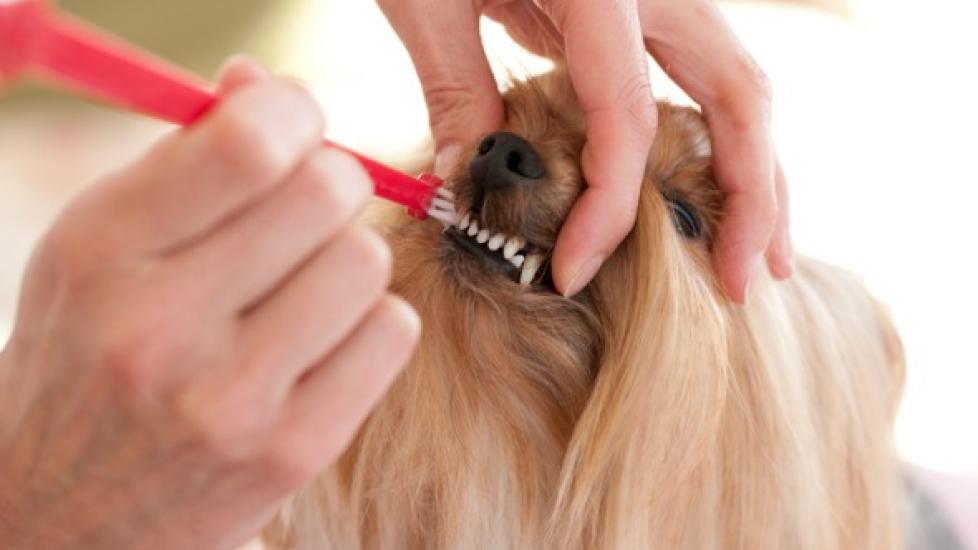Dog Dental Care: 6 Ways to Keep a Dog’s Mouth Clean
Dog dental care—it’s an important area of pet care that you can easily fall behind on. If your dog is a breed that is prone to dental disease (Greyhounds and every small-breed dog), or they have had many dental health issues in the past, it’s important to offer more than one type of at-home dental care in addition to the regular dental cleanings at the vet’s office.
Dog Dental Care Tips
Here are the best ways to keep your dog’s teeth and mouth as clean as possible and eliminate bad breath.
Brush your dog’s teeth with canine toothpaste.
Some dogs truly enjoy having their teeth brushed because canine toothpaste is usually flavored to suit a dog’s taste buds. Chicken, beef, and peanut butter are the most popular flavors. If your dog has a food allergy, use caution when choosing a flavor of toothpaste to use.
Dogs that are food-motivated and can sit still for a couple of minutes will generally do well with having their teeth brushed.
For large dogs, you can use a regular human toothbrush. For small dogs, it is best to either use a baby toothbrush or a fingertip brush. You can purchase a dog toothbrushing kit that includes the toothpaste, a regular brush, and a fingertip brush. (Example: Virbac C.E.T. Oral Hygiene Kit for dogs)
Brushing your dog’s teeth is similar to brushing your own teeth. Just get the toothbrush wet and apply a layer of toothpaste to the toothbrush, then brush your dog’s teeth. If your dog will not let you brush the inside of their teeth, that is okay. You do not need to rinse the toothpaste out of their mouth after you’ve finished brushing, either.
Try to brush your dog’s teeth 2-3 days a week, but if you have the time and your dog enjoys it, brushing their teeth daily would be even better! If you are concerned that your dog may bite you if you brush their teeth, do not attempt it. Instead, try some of the following options.
Add dental powder to your dog’s meals.
VetriScience® Perio Support is a flavored dental powder that is easy to apply to the top of your dog’s food. It contains a probiotic that helps promote healthy bacteria in your dog’s mouth and simultaneously kills plaque-building bacteria.
The powder should be applied to every meal your dog eats. It helps freshen your dog’s breath and prevents tartar and plaque from building up on your dog’s teeth.
Try a dental water additive.
There are several different water additives available for dogs, and they all work about the same. These oral solutions are tasteless. Based on the directions on the bottle, you will add a certain amount of the water additive to your dog’s water bowl daily. The solution helps freshen your dog’s breath and kills plaque-building bacteria in your dog’s mouth.
Ask your vet about prescription dental food.
For dogs that are opposed to the other options or are very prone to periodontal disease, a few dog food companies make prescription dental food that have been clinically proven to help reduce dental disease.
As your dog chews the food, the kibble cleans the surface of their teeth, and by doing so, reduces tartar buildup. The kibble also contains ingredients that help to kill bacteria that lead to plaque and tartar formation.
Purina® ProPlan® Veterinary Diets DH Dental Health, Hill®’s Prescription Diet t/d Dental Care, and Royal Canin® Veterinary Diet Dental formula for medium/large dogs and small dogs have all been formulated by boarded veterinary nutritionists and have gone through clinical trials to prove their efficacy. Since these diets require a prescription from a veterinarian, you will need to ask your vet about trying one of these formulas for your dog.
Give your dog dental treats.
When you pick out dental treats or chews for your dog, make sure they have the Veterinary Oral Health Council’s Seal of Acceptance on the packaging, as this seal indicates that these products help control tartar buildup.
One example is the OraVet® chewable treat that is given once daily. These chews reduce plaque and tartar buildup and create a protective barrier on the surface of a dog’s teeth that makes it harder for bacteria to stick and form tartar. The Purina® Pro Plan® Veterinary Diets Dental Chewz also help significantly reduce tartar buildup and are to be given occasionally as treats.
Take your dog for regular dental cleanings.
No matter how much at-home dental care you provide for your dog, tartar will still build up over time on your dog’s teeth, just like with our teeth. We may brush our teeth daily, but we still need a dentist to clean our teeth periodically. The same is true for dogs.
When enough tartar and gingivitis are present in your dog’s mouth, your veterinarian will recommend a dental cleaning (called dental prophylaxis). Your dog will need to go under general anesthesia in order to allow a veterinarian to properly clean off all the tartar on their teeth as well as the layer of tartar under the gumline.
Some dogs need dental cleanings yearly, and others every few years; it depends on the breed of the dog and the dental care that they receive at home.
Featured image: iStock.com/Liliboas
References
References
Pet dental care. American Veterinary Medical Association. https://www.avma.org/resources-tools/pet-owners/petcare/pet-dental-care
